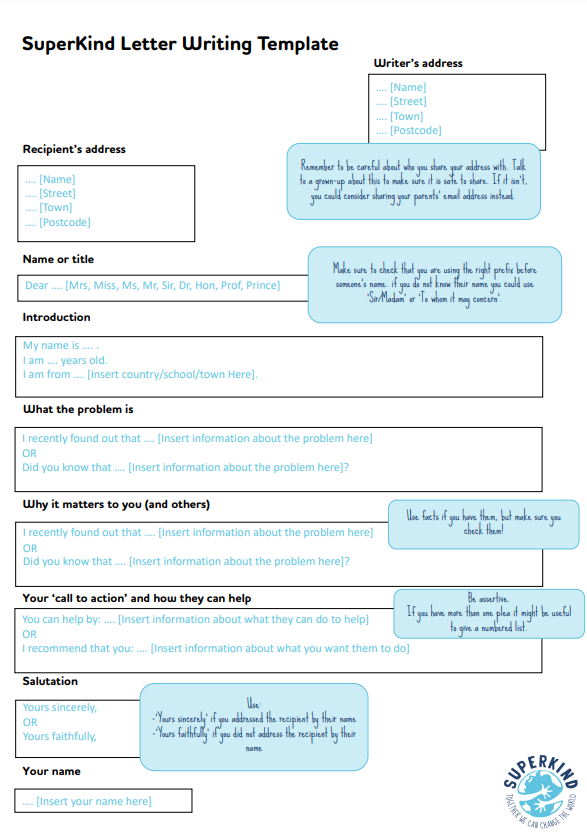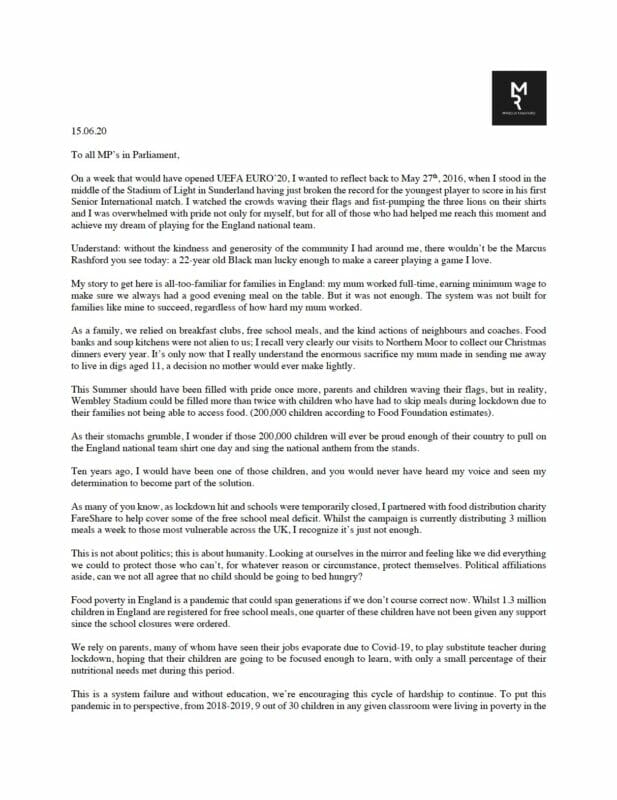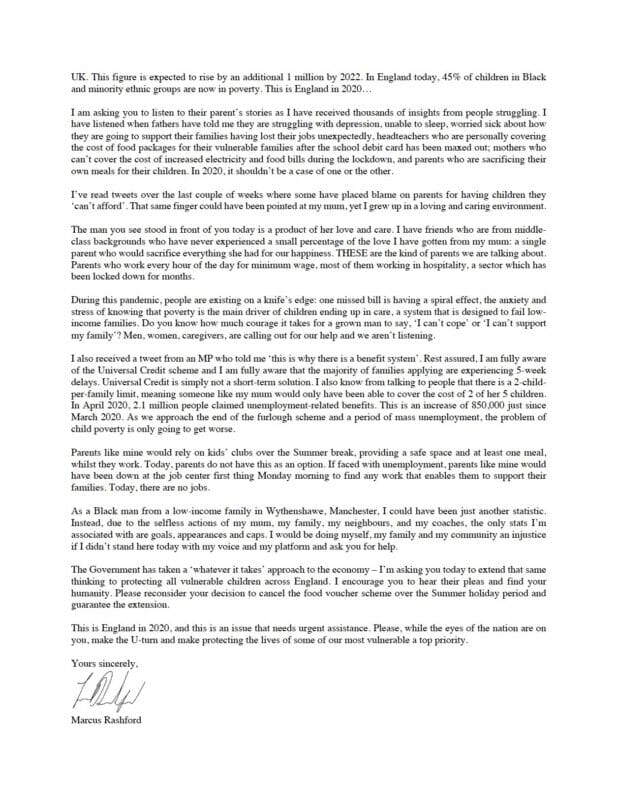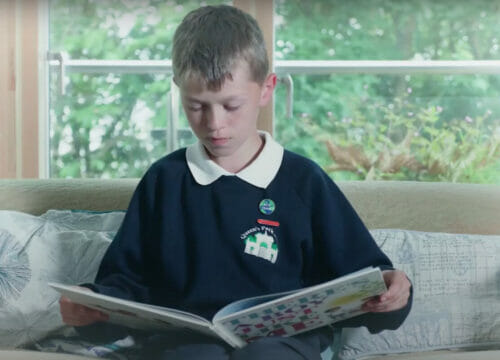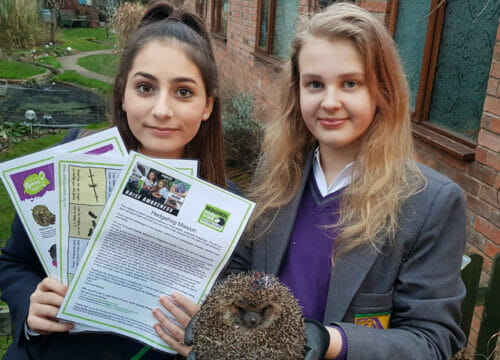Wrote a children’s’ book about refugees when he was 9 years old.
Writing Letters
Writing Letters
Written or typed letters are an effective way to communicate with people who you might not normally be able to talk to. For example, you can write letters to your local MP (Member of Parliament), a business you think needs to change, your head teacher, a news station and the list goes on. Unlike face-to-face conversations, when writing and answering letters, you can take as much time as you need to think about things and present your ideas in the best way.
Steps to writing good letters

1. Think about what it is you want to achieve.
Sometimes it helps to discuss your ideas with a friend or family member. Don’t be upset if they have any negative feedback – critical feedback at this point is like gold dust. It will help you refine your ideas and letter to be the best possible!

2. Find out the right person to write to.
Contacting the right person will depend on what you want to achieve. Here are some ideas of people you might like to write to:
- To create, abolish or change a law: your local MP (Member of Parliament)
- To change usage, waste and production: a person or business you think needs to change (it is a good idea to begin locally)
- To get public attention and raise awareness: a news station (maybe start with your local news station)
- To find help with something you are doing: a role model of yours

3. Find the contact details for the person you wish to write to (unless you can hand-deliver the letter, of course).
- Your local MP (Member of Parliament) – You can find contact details for UK politicians here.
- A business you think needs to change – If you are writing to a local business, you can hand-deliver the letter. If not, you can usually find contact details for businesses on the ‘Contact Us’ page of their website.
- A news station – You can find contact details for news stations on the ‘Contact Us’ page of their website.
- A role model – If you don’t already know this role model personally, you may be able to find their contact details online.
 If you decide to contact them on social media, then ask a trusted grown-up to do so on your behalf.
If you decide to contact them on social media, then ask a trusted grown-up to do so on your behalf.

4. Write the letter.
We have created a nifty template that can be found at the bottom of this page. Remember to keep the letter short and simple. The person you are writing to is probably quite busy. You want to grab their attention, tell them what you need from them and then leave them with enough time to go and do it!

5. Post/email the letter.

6. Follow up.
When you receive an answer, reply to them as soon as you can – strike while the iron is hot! If you don’t receive an answer, don’t be afraid to write again. Remember, if it were easy, it wouldn’t be worth it!

REFLECT
Writing letters is not only a great way to make a difference but it’s also a great way to learn a new skill.
Don’t forget to have a think about what went well, what you might have learnt for the future, and the impact of your actions.
For example, did you learn anything new about how to write a letter or where you can find the details of who to write to? Did your letter have the effect you wanted? And if not, what might you be able to change in the future?
Letter Writing Template
Letter Writing parties
The more the merrier! Getting a group of people to write their own letters or even just to sign your letter, shows there is strong support for the idea and puts extra pressure on people in power to act.
A good way to get lots of people involved is to host a letter-writing party. Invite as many people as you can, take a little time to talk about the issue as a group and then give people the time to write their own letters. Providing pens, paper, envelopes and stamps can help things move smoothly. You could ask everyone to bring a little donation to cover these costs. Most importantly, don’t forget the snacks!
A letter that Changed the world
From ancient times to modern times, people have been writing letters to communicate with others and ask for help. One letter that recently received a lot of praise and attention is a letter by Marcus Rashford.
You might recognise Marcus Rashford as the English professional football player who plays as forward for Manchester United and the England National Team.
But Marcus isn’t just a hero on the football pitch, he is a world hunger activist.
During the pandemic in 2020, Marcus Rashford became aware that many children were not able to access their free school meal due to not being in school. This meant that many children were going hungry. Marcus grew up in poverty himself and knew what a difference free school meals made to his family.
He wrote a letter to the government requesting that children out of school still receive a meal. And within 48 hours, the government agreed to provide free school meals even during the holidays. You can read the letter he wrote on the right.
Change-Makers
Letters can be a very effective way of communicating ideas. Check out some change-makers who have used letters to make an amazing difference to the world:
Kyra Barboutis and Sophie Smith
Saving the lives of hundreds of hedgehogs in the UK since they were 9 years old.
Olivia Ohlson
Set up organisations supporting cancer patients, people in poverty, and promoting golf in young black girls, since she was 10 years old.
José Quisocala
Creating and growing a bank that helps children save money by recycling since he was 12 years old.
Jack Berne
Fundraising for the farmers whose incomes have been affected by drought in Australia since he was 11 years old.
Guro Heggholmen
Challenging the representation of girls and women in society since she was 11 years old.



